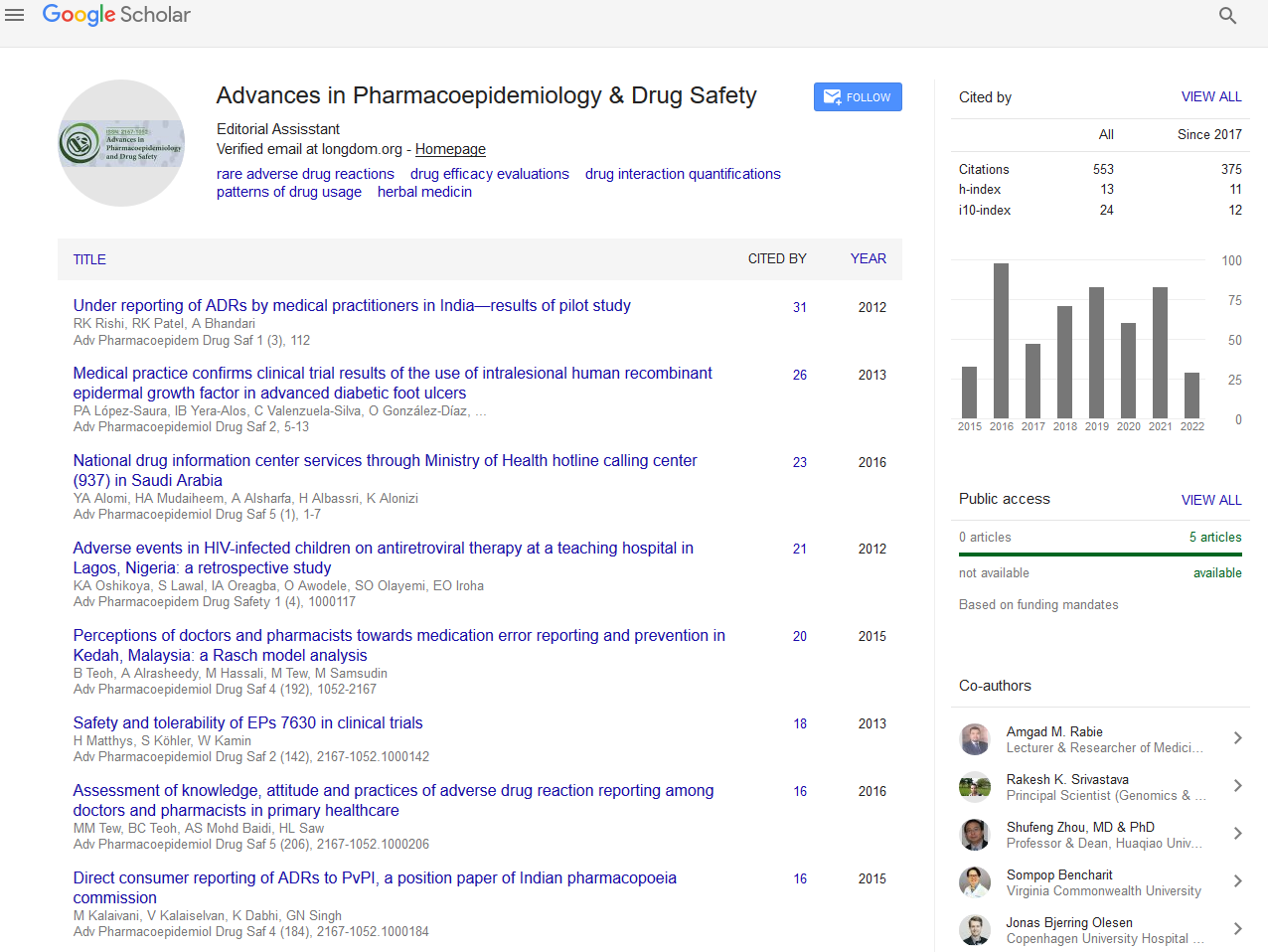Indexed In
- Open J Gate
- Genamics JournalSeek
- Academic Keys
- JournalTOCs
- RefSeek
- Hamdard University
- EBSCO A-Z
- SWB online catalog
- Publons
- Geneva Foundation for Medical Education and Research
- Euro Pub
- Google Scholar
Useful Links
Share This Page
Journal Flyer

Open Access Journals
- Agri and Aquaculture
- Biochemistry
- Bioinformatics & Systems Biology
- Business & Management
- Chemistry
- Clinical Sciences
- Engineering
- Food & Nutrition
- General Science
- Genetics & Molecular Biology
- Immunology & Microbiology
- Medical Sciences
- Neuroscience & Psychology
- Nursing & Health Care
- Pharmaceutical Sciences
Strengthening the clinical evidence provided by observational studies
11th International Conference on Pharmacoepidemiology and Clinical Research
October 02-03, 2017 Kuala Lumpur, Malaysia
Abraham G Hartzema
University of Florida, USA
Keynote: Adv Pharmacoepidemiol Drug Saf
Abstract:
Why is the clinical evidence from observational studies in the literature often conflicting and delayed? We will address the efforts undertaken in the US FDA to provide more recent evidence on the safety of newly marketed drugs as mandated by US Congress. The Sentinel system is a distributed data system that allow for the time analysis of emerging drug safety questions. The automation of the safety queries and the large population covered (120 male patients), allows for the timely analysis and provide the statistical power to address safety question in the early uptake of drugs in the marketplace. The second important question is the often conflicting evidence presented in the literature. What is the source of this conflicting evidence? Our group has conducted significant research in the influence of biases, confounding and the interaction of statistical methods and structure and quality of data on the clinical evidence presented. Running statistical methods, including high dimensional propensity scores on 12 different databases we found that self-controlled designs, those observational designs in which the patient serves as its own control are the most powerful designs as these provide the opportunity to control for fixed confounders. These methods do not control for variable confounders and are most suitable when the outcomes follow immediately after drug exposure. Other issues considered are case identification in large databases and formulating search algorithm that have high PPVs to make sure that cases are indeed attributable to the exposure. Recent proposed methods include sensitivity analysis to test the robustness of the clinical evidence identified. Adherence to these practices will assure that the clinical evidence presented is valid and can be incorporated in practice guidelines.
Biography :
Abraham G Hartzema is a Professor and Eminent Scholar at the University of Florida in the Department of Pharmaceutical Outcomes & Policy. He is the Perry A Foote Chair in Health Outcomes Research and a Professor of Epidemiology and Biostatistics in the College of Public Health and the College of Medicine. In the year 2007, he was awarded the University of Florida Foundation Research award. He has widely published on various aspects of prescription drug safety, including several books on pharmacoepidemiology. He has served on the scientific board of the FIP from 1988-1996 and on Editorial Boards, including Medical Care, Annals of Pharmacotherapy, Clinical Therapeutics, the International Journal of Pharmacy Practice, Pulmonary Circulation and others. He has been the Chair of Data Safety and Monitoring Boards for several RTCs at the University of Florida. He has also served on the University of Florida Graduate Council and Grant Review Panels for AHRQ, FDA, HealthCanada, DSEN, NASA, NIH and NIHBL. He currently serves on the United States Pharmacopeia: Nomenclature, Safety and Labeling Expert Committee. He was recently appointed as a Senior Advisor to the FDA, Center for Devices and Radiological Health.


